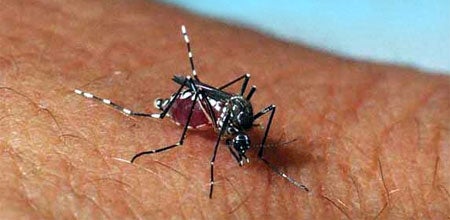
Infectious diseases and disease transmitted by vectors are the leading cause of mortality and morbidity worldwide. Emerging or reemerging infectious agents such as Ebola and Zika fever, have increased significantly in the last 50 years, largely because of rising human population, the development of antibiotic resistance, climate change, rapid globalization and modern air travel. California is a major gateway into North America for infectious diseases originating in south/central America and Asia as evidenced by the recent measles and chikungunya outbreaks in neighboring southern California counties. CIVDR at UCR is well positioned to become a center of excellence in translational infectious disease and vector research. Supporting assets on campus include Departments of Entomology, Biology, Biochemistry, Molecular, Cell and Systems Biology, Microbiology & Plant Pathology as well as the Division of Biomedical Sciences in the School of medicine and finally the Departments of Computational Science and Physics and Astronomy in the College of Engineering.
Some focus areas of CDVR members are:
-
Immune responses to bacterial, viral and parasite infections.
-
M cells and Mucosal Immune Surveillance.
-
Mucosal Vaccines.
-
Macrophages in mucosal immunity and inflammation.
-
Developing methods for manipulating the structure of the gut microbiota with a view to providing prophylaxis against bacterial enteropathogenesis.
-
Systems Biology of Plasmodium falciparum throughout its life cycle.
-
Immune response in the brain following Toxoplasma gondii infection.
-
Comparative genomics in Fungi.
-
Dissecting the molecular and biochemical mechanism of egg development in mosquitoes.
-
Dissecting the molecular and biochemical basis of immunity in mosquitoes.
-
Understanding the molecular basis of aphid and nematode resistance in plants.
-
Developing and implementing gene silencing approaches in mosquitoes and agricultural pests.
-
Developing genetic strategies to prevent the spread of human and plant pathogens by insects.
-
Developing and implementing gene drive systems in insects.
-
Understanding the molecular and physiological basis of odor reception in mosquitoes and other pest insects.
-
Understanding the genetic and molecular relationships between transposons and their hosts.
-
Developing and implementing superior Bt-based insecticides for mosquito control.
-
Improving wetland management for mosquitoes.
-
Using genomics based approaches to understand and control the transmisson of Xylella by insects.
-
Increasing the effectiveness of bait and trap technology for pest insects.
-
Harnessing genomics to understand insect biology, with current focus on the mosquito, Culex pipiens quinquefasciatus, a vector of West Nile virus and filariasis.
-
Understanding the basis of the interaction between the endosymbiont Wolbachia and its insect host.
